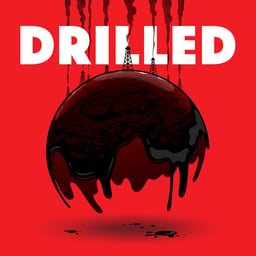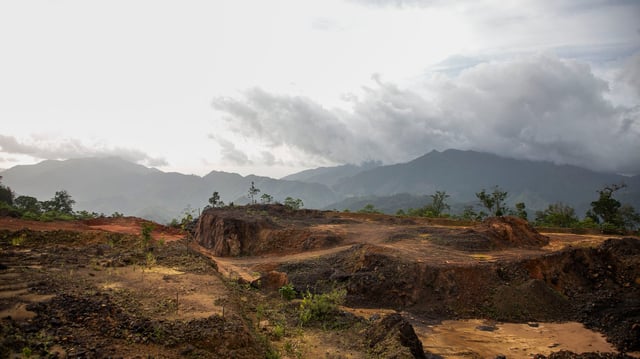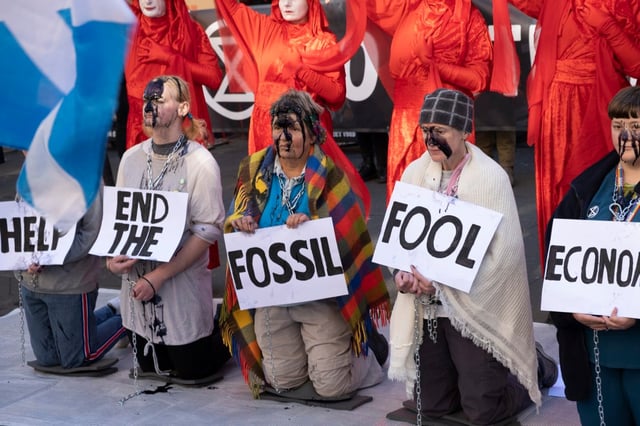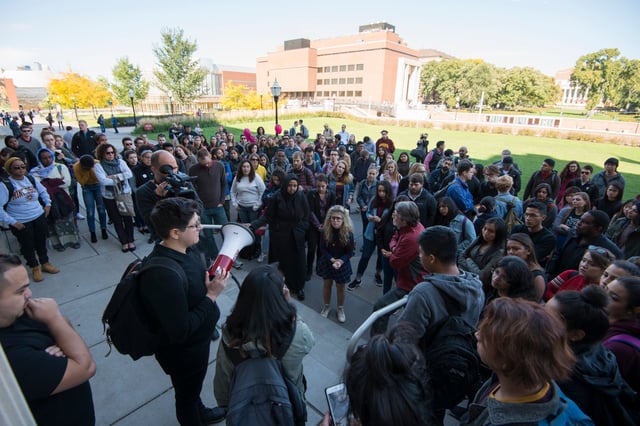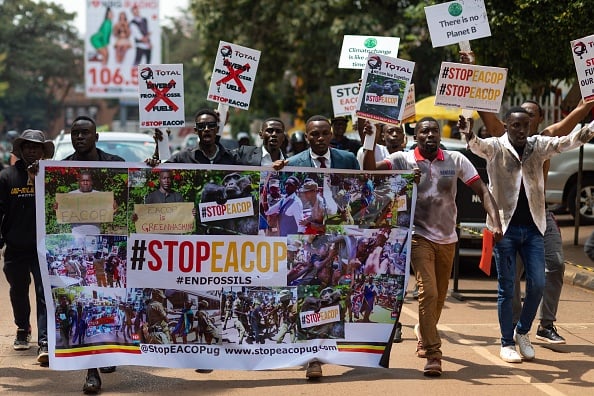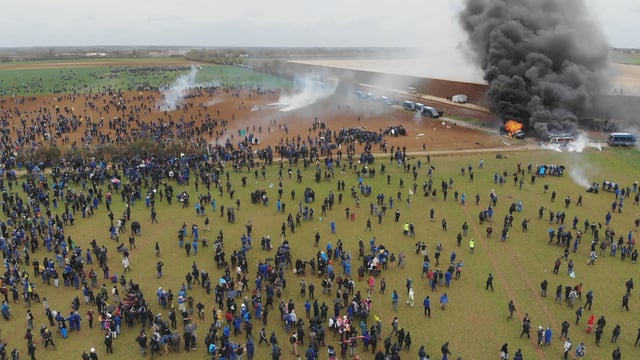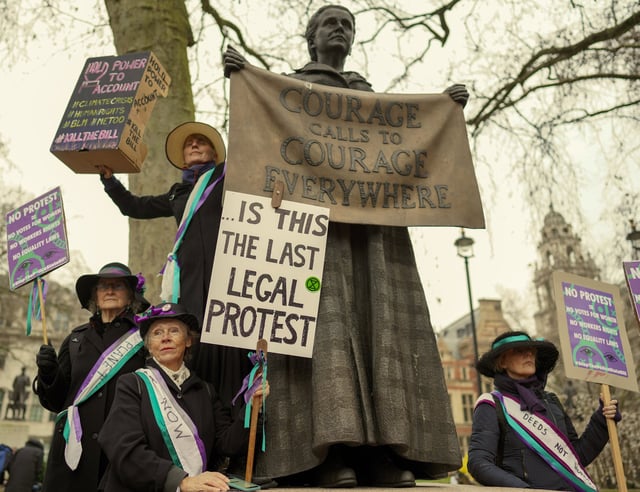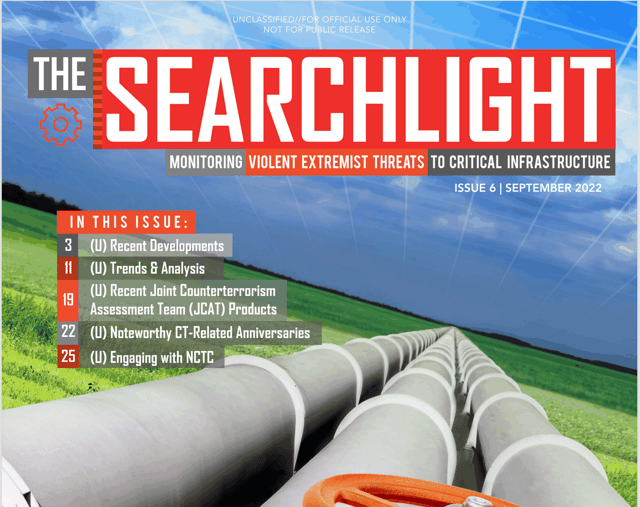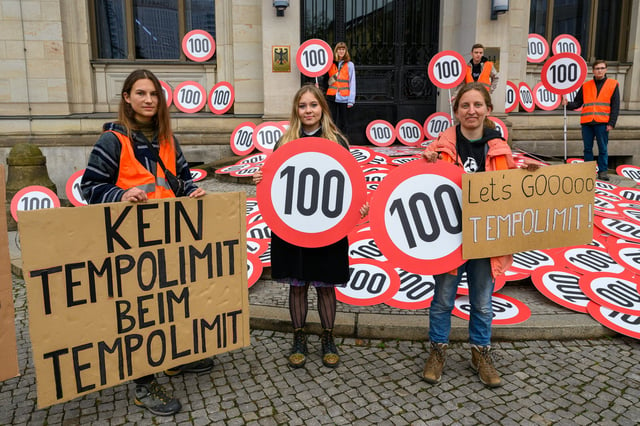Drilled • Season 10 Episode 5
S10, Ep5: How Think Tanks Laid the Groundwork to Criminalize Climate Protest
About This Episode
Transcript
[00:00:00] Al Jazeera: Well, the raid started this morning at around 7 a. m. 15 properties were searched this morning in seven of the German, of the 16 German states. So that is a pretty big operation where some 170 officers were involved altogether.
[00:00:18] Amy Westervelt: In May, 2023, German police conducted a massive raid on the homes of leaders in the climate group Last Generation.
[00:00:26] Last Generation Activist: Our website and our email have been taken down and several technical devices have been confiscated and accounts are blocked. It doesn't mean that the resistance will stop.
[00:00:34] Amy Westervelt: It was a pretty rapid escalation. Last Generation had only just started staging protests in January 2022. The group began as just seven young people in Germany who went on a hunger strike trying to get the frontrunners in the 2021 national election to talk, just talk, about climate change. After three weeks and multiple hospital visits, only two of the activists remained on their hunger strike and they managed to get the presumed winner of the election, Olaf Scholz, to agree to host a public discussion about the issue.
70 percent of Germans believe they are more concerned than their government about climate change today, and as a result, have become pretty pessimistic about the government's ability to pull through on its climate commitments. So in late January, 2022, activists with Last Generation began blocking roads.
Within months, a prominent conservative politician, Frank Schaffler, was sounding the alarm about them being extremists and terrorists, and multiple other politicians joined in. When Last Generation activists painted the headquarters of his party, the F. D. P., Schaffler compared them to the R. A. F., or Red Army Faction.
Also known as the Bader Meinhof gang, the RAF was a far left terrorist group that routinely kidnapped, bombed, and assassinated its targets beginning in the 1960s. Because, sure, throwing mashed potatoes at a painting is totally the same thing.
[00:02:09] Last Generation Activist: People are starving. People are freezing. People are dying. We are worrying about a painting.
[00:02:28] Amy Westervelt: That's the stunt that drew international attention to Last Generation, throwing mashed potatoes at a Monet. The activist talking there says people are starving, people are freezing, people are dying, and you're worried about tomato soup or mashed potatoes on a painting. Schaffler called the stunt terrorism.
It'd be easy to laugh off if German media hadn't started repeating the RAF thing pretty quickly. Here's Spiegel TV covering the spray paint incident and saying some are concerned about Last Generation being a green RAF.
[ Spiegel TV video]
Pretty quickly, Schaffler started referring to Last Generation as a criminal organization and used his position in the German parliament, or Bundestag ,to call for the group to be investigated, particularly with respect to their donations. As media coverage continued and raids like the one you heard at the beginning of this episode started to happen, police were beginning to sound an awful lot like Schaffler.
[00:03:51] Al Jazeera: Seven suspects between the ages of 22 and 38 are accused of Forming or supporting a criminal organization. And of course, that is quite a heavy accusation here. That can also be charged with five years up to five years in prison. Well, the main accusation is that those suspects that I've just mentioned have organized fundraising to finance further crimes for the Last Generation.
[00:04:17] Amy Westervelt: Schaeffler hasn't historically been a super powerful guy in German politics. He's best known for being the guy who didn't want to bail out Greece during the 2011 debt crisis. A move that saw him ousted from parliament for four years. Today, in addition to stoking fear and anger towards Last Generation, he's been credited with blocking a climate bill that the government had unanimously passed.
It would require that all newly installed heating systems are powered by at least 65 percent renewable energies by next year, effectively banning oil and gas in new buildings. Schaffler has stalled its passage and the gas lobby has been spending a lot of money to fight it, so what was once a done deal is now uncertain.
One possible reason for Schaffler's sudden turn as a big anti climate guy is what he did with his time off from parliamentary politics: he started a libertarian think tank, the Prometheus Institute, and he managed to get it into a powerful global network of like -minded think tanks, the Atlas Network.
[00:05:33] Atlas Network Promo Video: Atlas Network is, as the name suggests, a network and it's global. We work all around the world. We're based in the U. S. We have about 159 partners in the United States right now. And the bulk of our partners are outside. Atlas Network, it connects people, from all over the world, defending the idea of human dignity, defending human rights and personal liberties.
[00:05:59] Amy Westervelt: This is a little intro video to the Atlas Network from the organization's YouTube channel in 2021. The network was formed in 1981, but to understand what it is and why it's so powerful, we've got to go back in time a few decades to the fifties, to the first of these think tanks, the Institute for Economic Affairs and the guy who started it, Antony Fisher.
So Fisher was like most of the major protagonists of the movement, was born to a quite wealthy family. This is Jeremy Walker, a senior lecturer at the University of Technology, Sydney, who's written more about the Atlas Network than anyone. He went to Eaton, the elite school across the river from Windsor Palace, and went to Cambridge.
He was wealthy enough that he and his brother bought an airplane for the fun. But he came from a family of mine owners. Fischer joined the Royal Air Force and was shocked that when Britain finally had an election at the end of World War II, the public voted for the more left leaning Labour Party. To Fischer, they represented exactly the sort of slippery slope to socialism he'd been fighting in Germany.
He read the Reader's Digest version of a book called The Road to Serfdom by economist Frederick Hayek, who also blamed socialism for all of society's problems. and sought Hayek out. At the time, he was a professor at the London School of Economics. Fisher told Hayek he was considering getting into politics to do something about this situation, and Hayek advised him against it.
[00:07:40] Jeremy Walker: Hayek said, no, there's no point going into politics. What we need to do is change what... The intellectuals think, like the, the teachers, the journalists, these are the people who paved the way for public acceptance of Keynesianism and the idea of welfare state.
[00:07:58] Amy Westervelt: Fisher would later go on to talk about this as waging the war of ideas.
In 1954, Hayek invited him to be part of a network of neo liberal thought leaders called the Mont Pelerin Society.
[00:08:10] Jeremy Walker: That's very interesting in that letter that he writes, it says, we don't do propaganda. That's not what we do in the Mont Pelerin Society. It's a kind of intellectual society where we debate economics and policy problems of the day to defend and advance liberalism against this tide of socialism, which is washing over the world.
[00:08:32] Amy Westervelt: Fisher took Hayek's advice to heart, and instead of launching a political campaign, he started a research institution, the Institute of Economic Affairs, in the UK in 1955. It fashions itself as the UK's original free market think tank. Ironically, the money that paid for the IEA initially came from the fortune that Fisher had amassed by bringing the idea of caged chicken farming from the U. S. to Britain. Because nothing says freedom like caging some animals.
The IEA puttered along for a few years, putting out research papers, and then something happened to elevate its status in the world.
[00:09:16] Jeremy Walker: The early 60s, Shell comes on board and starts to back him. They finance him as well as BP, and then things start to change.
They start to, you know, begin to have some influence.
[00:09:28] Amy Westervelt: I'm Amy Westervelt, and this is Drilled. The Real Free Speech Threat. How big oil helped Fisher take over Britain and ultimately the world, and what it all has to do with the crackdown on climate protests today after the break.
[00:09:48] Jeremy Walker: So the thing with the think tank method was it allowed corporations to say things that they couldn't say themselves without appearing to be merely speaking to their particular, you know, interest in profit. This is Jeremy Walker again. Think tanks are so ubiquitous today that sometimes it's easy to forget that they've actually had and continue to have a pretty major impact on society and public policy.
In a lot of ways that began with Fisher and the IEA. By the seventies, they're having a real impact, right? They're getting a lot of press. And the way that it would work was they would get these, you know, professors to write short digestible articles, whatever it would be about, you know, often it was things around currency conversion or sort of things that were fairly technical to the non economists.
But then these wealthy donors to the IAEA would then buy like copies and send them to all the schools and the universities. But to accomplish that whole corporation speaking without people knowing that it's them thing. The IEA kept those wealthy donors hidden. The research papers seem like just original research.
They weren't coming out of a university, but they were on par with university research and often written by professors.
[00:11:05] Amy Westervelt: Long time listeners of this podcast might hear echoes in this strategy of the approach that early PR pioneer Ivy Lee took when the Pennsylvania Railroad was trying to combat new regulations in the U. S. at the turn of the century. Lee created the Bureau of Railway Economics. He staffed it with legit and credible economists and put out dry white papers on the broader economic impacts of things like safety requirements or increased wages for rail workers. The press, not knowing that the research was paid for by the rail company, quoted from it like it was entirely independent research.
In Fisher's case, the work the IEA was doing wasn't just for the benefit of one particular industry or company. He wanted to change how a large segment of society viewed how the economy and the government should work, period.
For oil companies, the think tank approach was part of a broader propaganda strategy.
[00:12:16] Jeremy Walker: The same time as Shell and BP were sponsoring the Institute of Economic Affairs to do business propaganda to the British electorate against the post war welfare state, they were also financing the British secret intelligence service overseas, the MI6, to do propaganda in all of the countries in the Middle East and Africa where they had operations.
So, in a sense, yeah, the oil companies were sponsoring two kinds of propaganda, one which was Civil and directed at the electorate in Britain and another one which was linked to the British secret services policy to maintain friendly governments towards the British oil companies in the Middle East.
Fisher and his work at the IEA was key to those efforts. So around. The early 70s, Fisher becomes very much in demand. You know, they can see that what he's doing is having a big impact.
[00:13:11] Amy Westervelt: Meanwhile, Fisher's farming business was not doing so well. Having sold the chicken farming business, Fisher invested in a new venture, turtle farming in the Cayman Islands.
As he had done with chicken, Fisher thought he could use captive farming methods with turtles to create a cheap source of protein for people all over the world. But some pesky environmentalists got in the way and ruined it all. They got politicians across the world to ban turtle products and the venture went belly up.
Fisher lost a lot of his farming fortune, all of which made the success of the IEA that much more important to him.
[00:13:58] Jeremy Walker: He, um, came to the United States in 1970 and did a speaking tour where he exhorted, uh, American business to fight back against this apocalyptic tide of regulation and social movements and stuff, you know, the environment movement, all the social movements of the sixties, and he had the method for how they could do that. He was invited out by. The Institute of Humane Studies, which was founded by Baldy harper, who was also a Montpelerin Society member. Today, the group UnKoch My Campus, which advocates for getting dark money in general and Koch family money in particular out of universities, describes the Institute for Humane Studies as a recruitment arm for the Koch network. It's a campus program based at George Mason University that acts as a sort of talent pipeline for Koch think tanks, front groups, and advocacy projects. Back in 1970, though, it was still just getting started and looking for a way to further the conservative cause in the U. S., which is what led them to invite Fisher over.
And they invited him out, and the main sponsor was Charles Koch. He also controlled the board, and Fisher did a tour in the States in 1970, including tobacco executives and so forth. So the i e A starts this correspondence with the I h s. And so this connects, um, Koch and his lieutenants to, to the IEA around 1970.
The conversations between Fisher's IEA and Koch's, IHS built the foundation for Fisher to go beyond Thatcherism and go international. A few years later, Fischer got invited to Canada, and it's there that he ended up starting his first think tank outside the UK.
In 1974, Fisher is invited to Canada to establish the Fraser Institute.
It's very difficult to find anything much out about that, but the Fraser Institute, um, certainly was, um, connected very much to the question of the development of, um, Oil and gas in Canada. The world's major oil companies continue to back Fisher in all of his various endeavors as he started to branch out.
All of the major oil companies, obviously there's Shell there, but there's also the American oil companies at the same time. Um, the North Sea oil is being opened up, and this is a big deal because this breaks the OPEC cartel. And so, Fisher gets invited to Canada, they set up the Fraser Institute around the time that the tar sand oil was being developed, and again on the early boards, you've got people from Imperial Oil, which is the Exxon subsidiary in Canada, you've got the Royal Bank of Canada in the corporate board, which is the biggest investor in.
Oil and gas in Canada. There was a lot going on for the oil industry at this moment in time. It's the mid 70s, so right around the time that people in other countries start inviting Fisher to come and start think tanks, you've got multiple Middle East countries kicking U. S. and European oil companies out.
Suddenly, after profiting from the resources in those countries for decades, they had to start looking for new oil, and they were getting desperate to find some. Then you get the Arab oil embargo in 1973 as a response to the U. S. providing military aid to Israel, and that kicks off an energy crisis. At the same time, oil company scientists are starting to put out papers about the greenhouse effect and this big potential looming problem for the industry.
And you've got a bunch of new environmental regulations being passed, both in the U. S. and all over the world, so industry is really on its back foot. We've covered before how much they started to lean on PR during this period to deal with this whole situation. Walker has documented how they also started to lean on the think tank approach during this time.
So with all of this new environmental regulation coming to oil companies as well as public support for nationalization of domestic oil and gas. And there's also at the same time, a huge kind of deep mistrust of transnational corporations. So the whole critique of corporate transnational corporations in the developing world and in the West, you have, um, this great attention to, you know, to, to companies, um, providing arms to the Vietnam war like Dow and so on.
That had also been highlighted by, um, Rachel Carson's book, The Silent Springs. So they've got all of these threats coming toward them. And so they can't go out there and do what might've been done in the fifties and, you know, hire Ronald Reagan and have the general electric hour on a TV show. They can't do anything in their own names, right?
And so this is where the Fisher method comes in. After Canada, Fisher got invited to Australia to set up a think tank there, and then back to the U. S. to set up two more. And Fisher quite literally describes what he does after, you know, from the mid 70s on is establishing IEA clones, right? So just taking the method and then reproducing it, um, It's beginning invited by very wealthy businessmen and corporations to, to, um, produce this new method of influencing public opinion and pushing back against these movements for, uh, public control of oil rents and public, um, control of pollution.
In Australia, Fisher helped to found the Center for Independent Studies with the help of a wealthy businessman. He's invited by a man called John Bonython, who ran one of Rupert Murdoch's newspapers in Adelaide, which is where, um, Rupert Murdoch's corporate empire begins, in South Australia. In the early 1970s, Australians were calling for nationalizing oil, coal, and gas, passing environmental regulation.
and passing legislation that protected Aboriginal land rights for the first time. Murdoch used his media empire to campaign against all of it, and eventually that campaign was successful, triggering a constitutional crisis in 1975 that put conservatives in power. But businessmen and wealthy elites in the country were worried that public sentiment was not really on their side.
And that is where Fisher came in. This is what Fisher did was just basically target the people who were scared, who had the most to fear, who were, you know, laying bed awake worrying if they're gonna be kidnapped by revolutionary Marxists or whatever they were worried about. Um, and just play on these anxieties and, and then paint this apocalyptic scene for them.
Um, you know, massive inflation and strikes and, um, you know, uh, government debt and overtaxation and punishment of, you know, rich people and, and they would, they would hand him some money and, um, he would then ask them for more connections. It was, um, Fisher that really did the work of galvanizing capitalists to the cause of, uh, the need to have a new.
Uh, Institute in Australia like the I a a and it was, it was called the Center of Independent Studies, and the founding grants for that came from, uh, the Murdoch Press from Shell, e h p Rio Tinto in the us Fisher helped to start two new institutes. There was the Pacific Research Institute in California, which was meant to deal with environmental regulation.
In fact, its original name was the Center for Economic and Environmental Analysis. The idea being to consistently remind people that compromises needed to be made on environmental issues in order to ensure that the economy would continue to grow. But the environmental movement wasn't the only social movement causing trouble in the U.
It's pretty incredible how often Fisher turns up at all these key moments in history. But for our purposes, it's particularly interesting to note that environmentalists were a problem for him the whole way through. From his failed turtle farming venture in the Cayman Islands, to the regulations that environmentalists were pushing in the early 70s, to the formation of an entire institute to deal with it, the Pacific Research Institute.
Shortly after he started it, he began looking for funding and support to turn his little collection of IEA clones into a cohesive entity, a network of think tanks that could work together and inform each other, and also act as an incubator for more think tanks. The Atlas Network was founded in 1981.
Almost immediately, Fischer began turning his attention to Europe and Latin America, two areas where a tendency towards socialism had been concerning business interests for a long time. Fischer started the Atlas Economic Research Foundation to replicate their success. of his first effort in this field, the Institute of Economic Affairs in the United Kingdom.
He saw that after decades of serious work, it influenced the country and the world. So he wanted to replicate success and also try to win some policy battles. This is Alejandro Chafuin. He was eventually tapped to run the Atlas Network, and he ran it from 1991 until 2018. He thought that many think tanks working on the same topic were more effective than a single voice.
You know, producing research that is rigorous enough to be used at universities. but also accessible to the educated layman. And in that way, help change public opinion and finally change policy in different corners of the globe. Chafwin started out as the Atlas Network's Latin America director. I had a vision to bring more think tanks from the Americas to the freedom movement.
And when he, he met me, who, I came from Latin America, he again appointed me like Director of Latin American Affairs, uh, uh, and let me go. I was very young, he sent me to see donors, to, to raise funds, to create a program, and that has led to Atlas becoming perhaps the, the, the leading supporter of think tanks in, in the Americas.
At one point, Chafwin was asked to explain who the audience was for Atlas Network, and he boiled it down to one word, elites. One of the very first think tanks created by this newly formed Atlas Network was the Institute for Liberty and Democracy in Peru. It was started the same year the Atlas Network started, 1981.
And its founder was a well known economist, Hernando de Soto. De Soto came up with a theory that wound up reverberating throughout the Atlas Network universe. It's a really good example of just how much these think tanks talk to each other and how ideas spread. Here he is giving a TED Talk in 2011.
Explaining his strategy for dealing with indigenous environmental activism.
He says one of the consequences of treating indigenous people like they're straight out of the movie avatar is that they don't have property rights. And that various international and environmental organizations argue that indigenous people don't want property rights, that they prefer to wander through the forest, but that when he and his team went to see for themselves, what they found was extreme poverty in indigenous communities.
For de Soto, the solution... is property titles, property rights, which would then let Indigenous people make money off their land, and in particular off of selling or extracting the resources from it. This is, perhaps unsurprisingly, something that a lot of Atlas Think Tank members in the U. S. have argued as well.
Naomi Schaefer Riley, a senior fellow at the American Enterprise Institute, has argued that the reason Indigenous people in the U. S. experience higher poverty rates is because they don't have property rights, and expressly not because of anything to do with colonialism. De Soto came up with his version of this theory after a bloody standoff between indigenous environmental activists and police in Peru in 2009.
Dozens of people are estimated to have been killed in clashes between police and indigenous activists protesting oil and mining projects in the northern Peruvian Amazonian province of Bagua. Indigenous leaders were protesting the encroachment on their land by various interests, including timber, Mining and oil and gas eyewitness accounts indicate the police fired live ammunition and tear gas into the crowd.
DeSoto argues that the solution to all of this is just to cut indigenous groups in on the prophets.
It's all very well, he says, not to drag Indigenous people into globalization, not to pull them under the law. But the result is that their resources are going to be extracted, and other people will get rich off of them, instead of the Indigenous people themselves. In other words, there is no world in which extraction is not the point.
We're going to get into this mindset in more depth in an upcoming episode, but for now it's important to understand that this is the sort of paradigm colonizers have been trying to impose on Indigenous people for centuries. So, not exactly a novel economic theory. This idea shows up in Canada a couple years later, when conservatives put out a bunch of papers in the wake of Indigenous led protests.
The Macdonald Laurier Institute, another Atlas Network think tank and a partner of the Fraser Institute is the source. We go back over 50, 60 years, the mining sector and Indigenous communities did not always get along well. There were actually some serious problems that emerged sort of over time. We know now that Indigenous communities must be key partners in the mining process.
More recently, starting around 2019, Magat Wade, the leader of Atlas Center for African Prosperity, began repeating a lot of these same talking points in discussions about climate action and development in Africa. My first company, we had started a nonprofit. Because my goal was, how can I help replicate whatever success I was able to have?
How can I help many other Magats or my male counterparts from Africa do exactly what I did with whatever product they deemed to do it with? How could I help with that? And it is during that journey that I eventually even learned about the work of Hernando de Soto. And when I heard about his work, he was right there telling me, Magat, what you went through.
is not an anecdote. This is very, very, something very systemic about this, and it is called economic freedom. Atlas Network members are not just loosely affiliated organizations. They meet up frequently throughout the year in both regional and international events, liberty forums. They show up on each other's podcasts.
They publish papers together. In the 90s, Chaffowin bragged about how the Atlas Network was an early adopter of the internet in order to stay connected and share ideas more easily. There's also a ton of overlap between people who work for the mothership, the Atlas Network organization. And people who work for various member think tanks with folks moving in and out of those orbits pretty frequently.
Chafwan himself, when he left the Atlas Network in 2018, went on to lead an Atlas Network member think tank called the Acton Institute. The Acton Institute is the home of another really good example of how ideas spread through the Atlas Network. It has pushed a sort of religious form of climate denial for a really long time.
It has often talked about environmentalists and climate activists as being religiously driven, a cult, that sort of thing. This is an idea that you start to see reverberate through the Atlas Network. In fact, we just heard Bella Debrera with the Institute for Public Affairs, an Atlas member think tank in Australia.
Talking that way in last week's episode. The Heritage Foundation and the Cato Institute in the U. S. talk this way, too. And the Cornwall Alliance, a group of faith based think tanks incubated by the Acton Institute, put out a 12 part series of videos on this topic, called Resisting the Green Dragon. Here's a snippet from the trailer.
In what has become one of the greatest deceptions of our day, radical environmentalism is striving to put America and the world under its destructive control. This so called Green Dragon is seducing your children in our classrooms and popular culture. Its lust for political power now extends to the highest global levels.
And it's twisted view of the world, elevates nature above the needs of people of even the poorest and the most helpless with millions falling prey to its spiritual deception. The time is now to stand and resist
the religious and political environmental movement. What we call the green dragon has become one of the greatest threats to society and the church in our day. Taking care of the earth sounds like a good idea because it is a good idea. What most Christians don't understand is that environmentalism is a whole worldview.
It offers its own doctrines of God, of creation, of humanity, of sin, and of redemption. And again, a lot of this stuff ends up making its way into public policy discussions and legislation. In 2019, for example, an Atlas Network group called Policy Exchange in the UK put out a paper about extinction rebellion.
It was called Extremism Rebellion, and it talked about how Extinction Rebellion were extremists and terrorists and potentially dangerous, and that something needed to be done about this new form of radical climate protest. Here's one of the authors of that paper, Richard Walton, who was a senior fellow with Policy Exchange.
advocating for a nationwide police response to Extinction Rebellion, and for new legislation around protest. They are certainly engaged in organized criminality on a large scale, and their sort of tactics, uh, is one of civil resistance, civil resistance model that is based on, on illegal action. Um, so, um, I think what we saw over the weekend, um, with the blockading of, um, the various, uh, news print outlets was, um, was, was a form of anarchism, effectively.
It was, um, you know, rather typical. Um, this is a group that, you know, rejects democracy and the liberal free market economy and explicitly seeks to overturn both. Just a couple of years later, the UK passed a new policing bill explicitly to deal with Extinction Rebellion style tactics, and in 2023, at a summer garden party for Policy Exchange, UK Prime Minister Rishi Sunak thanked them for helping to draft that bill.
Similar things have happened in the US, where industry drafted legislation that was created in the wake of the Standing Rock protests was spread to multiple states by another Atlas Network group, the American Legislative Exchange Council, or ALEC. Sometimes it's less explicit than writing legislation.
Here's Magat Wade again at an Atlas Network Liberty Forum talking about how she has managed to shift the conversation around climate action, particularly at the international level. It's not that we don't care about the climate change. I certainly care about Earth. I care about the environment. I am known for that, right?
But, on Earth, we also have these people. So you cannot tell me, especially if you're telling me that you care about Black lives, that Black lives matter, well, how about the fact that you're about to mess up the, um, the place where 90 percent of a representative of a Black... race lives, namely Africa. And so this led me to having my op ed being published on the, in the Wall Street Journal.
It's called the COP26 plan to keep Africa poor. So I am saying this because this is a winnable part of the argument. This is really interesting because Wade's talking points here don't just mirror how the fossil fuel industry talks about Africa, but have also started to show up all over the conservative universe.
Here she is, sharing her message on Jordan Peterson's podcast. Oh gee, climate change. I'm not even going to go and argue the scientific argument. I'm not. Your solution right now is to tell me we stop all carbon emission, we stop all fossil fuels right now. Right now. But Jonah, what does that mean if we did that?
What does that mean if we did that? Poor people will freeze in the dark and bake in the sun while they starve. Thank you. You just signed a death warrant for 1. 3 billion people, of them 1 billion black people. And you just told me that black lives matter.
And now, leading up to this year's Conference of the Parties. The annual UN climate conference, the fossil fuel industry's main message is essentially what Wade is saying. We can't deny Africa fossil fuel development, that moving off fossil fuels too quickly will condemn Africa to poverty. Debunked this idea many times in this podcast.
What they're doing here is cherry picking certain things and cramming them together into a simple message that resonates. But there are a lot of holes in this argument. For a start, if fossil fuel development were the fix for energy poverty, or any other kind of poverty, then Nigeria, which has been in the oil business for longer than any other African country, and is today the continent's largest producer, would not still be last in the world on energy access.
The fact is, addressing both poverty and climate change is complicated, and no one is really doing a great job of it so far. That leaves space for a simple message like Wade's, Climate advocates just don't care about poor people, to resonate, especially when it's then repeated over and over again by a whole ecosystem of talking heads.
It's a perfect illustration of how Fisher always talked about the think tank strategy, that it was about getting certain ideas into the public discourse and then leaning on influential people to repeat those ideas and push them forward until they eventually became policy or international diplomacy.
The way many of the Atlas Network think tanks talked about youth climate protests in 2019 is another great example. It turned up in a lot of countries, especially Australia, Canada, and Sweden. Here's Joanne Tran, a young intern that the Australian Taxpayers Alliance sent to Sky News to talk about how dumb it is to miss school.
Just can you tell us basically why did you decide you wanted to stay in school on Friday? One of the main reasons why I didn't go to the strike on Friday was because I fundamentally disagree with what the organization that was organizing the strike were advocating for. So, for example, one of their policies was 100 percent renewables and just economically, like, unviable projects like that.
And, um, secondly, I just think that we need to have a much more informed debate about this issue. And I just don't think a bunch of kids who don't understand the impacts of what they're advocating for, waving around posters telling the Prime Minister to go F himself, is the most, is the best, is the informed debate that we need in this country.
And frankly, you know, just them skipping school says a lot.
In this way, even when Atlas Network think tanks aren't writing legislation that criminalizes protest, they really help to create the conditions for legislation like that to pass. The example we started with in Germany is a good one. You also see this happening in Australia, and rapid crackdown on climate protest has gone almost unnoticed, even by politicians that supposedly support climate action.
Because so much has happened in the media, because there's been so much public discussion about how radical these activists are, or how annoying, or how these kids should just be in school. When legislation passes that criminalizes their activism, a lot more people in the public are willing to just sort of shrug and accept it.
Here's Jeremy Walker again. I'll throw something out into the public sphere, which will get a little bit of press, and then before you know it, a new law has been written, and now you have the criminalization of what was previously seen as legitimate. Civil protest.
That's it for this time. If you missed last week's episode on Australia, go back and listen. It's very much tied into everything we were talking about today. You will hear lots of other examples in countries where the Atlas network is very active throughout this season as well. So come back for that. And of course, we'll be covering lots of other topics throughout this.
The Real Free Speech Threat is a cross border reporting project from our newly expanded Drilled Global team. Our senior editor for this series is Aline Brown. Sarah Ventry and Martin Salz Ostwick are senior producers. Sound design and scoring also by Martin Salz Ostwick, who composed much of the music in this episode.
Peter Duff is our audio engineer. Additional reporting for this episode was contributed by Jeff Dembeke, Julianna Marullo, Lyndall Rollins, and Marlo Starling. Fact checking by Wudan Yan. Legal review by James Wheaton. Our artwork is by Matt Fleming. Our theme song is Bird in the Hand by Fore Known. The show was created by Amy Westervelt.
You can see a print version of this story on our website at Drilled. media. It's also been co published by The New Republic and DeSmog. So you can check out the story on those sites as well. If you would like to co publish or republish one of our stories, check us out at drilled. media and get in touch.
You can also sign up for our newsletter there. Access documents behind the reporting in this series and all of our other series and check out lots of related print stories. If you'd like to support our work, please leave us a rating or review. Share links to our stories or upgrade to a paid newsletter or podcast subscription for access to ad free early release episodes and bonus content.
Thanks for listening and we'll see you next week.
